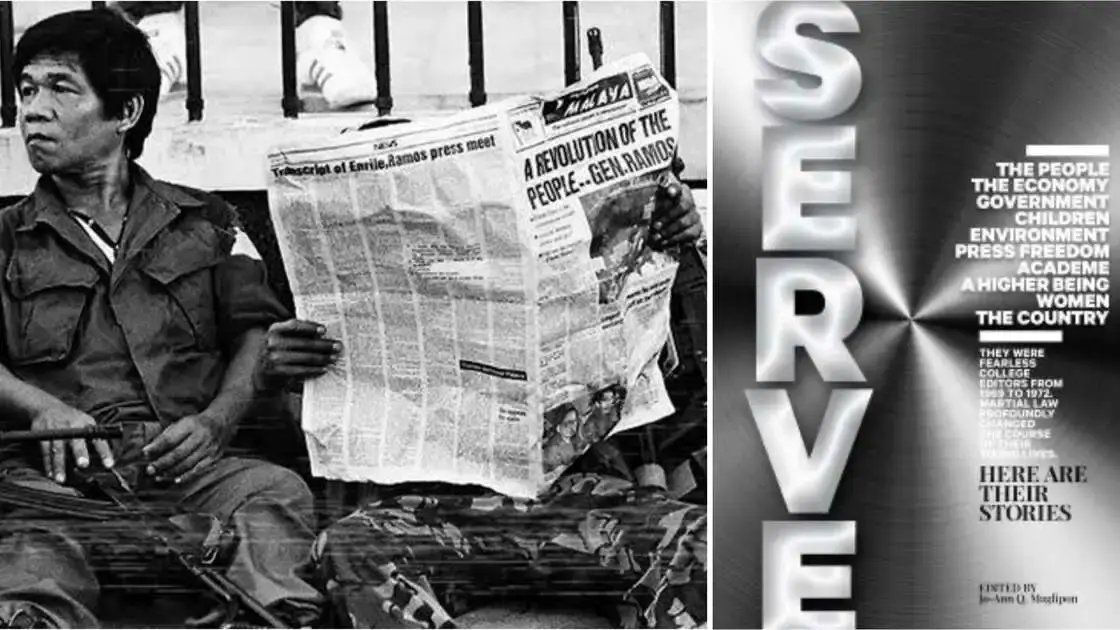
“So, why this book?” veteran journalist Jo-Ann Q. Maglipon said at the launch of the anthology, Serve. “To fight fantasy, forgetting, flagellation. To stop the gaslighting of activists of yesteryears for the resurrection of a dictator’s family. To rebuke the exhortation of harmony and unity, false and deceitful. To demand apology, atonement, redress. And yes, to remind the powers—we are here, we remember everything, and we write.”
Filipinos can continue to honor the courageous student journalists of the Martial Law era with the new book, Serve. Edited by Maglipon, Serve is an anthology of essays, photographs, and paintings about the dark chapter of Filipino history. In it, student journalists from 1969 to 1972 detail their experiences during Martial Law and “how the dictatorship and their resistance to it have changed the course of their lives,” stated publisher Ateneo de Manila University Press on its website.
Released during the month of the declaration of Martial Law’s 51st anniversary, the book was launched on September 9, 2023, at Fully Booked, Bonifacio Global City, Taguig. It is the sequel to Maglipon’s 2012 book Not on Our Watch, which also discusses the stories of 13 student journalists during Martial Law. This period witnessed the state shutting down media and setting up controlled outlets. The militaristic act silenced public criticism and controlled the information that the people had access to. Campus journalists faced the dangerous situation head-on and defied state control to reveal truthful stories behind the official state versions of the news.
Serve features the stories of 20 of these campus journalists: Alexander Aquino, Elso Cabangon, Jones Campos, Sonny Coloma, Bob Corrales, Mercy Corrales, Butch Dalisay, Manuel Dayrit, Jaime FlorCruz, Senen Glorioso, Eduardo Gonzalez, Diwa Guinigundo, Sol Juvida, Derly Magcalen, Thelma Sioson, Chito Sta. Romana, Judy Taguiwalo, Angie Tocong, Rey Vea, and Maglipon herself. The authors were actively involved in the College Editors Guild of the Philippines (CEGP), an alliance founded in 1931 by four college student publications: The National of National University, The Varsitarian of the University of Santo Tomas, the Philippine Collegian of the University of the Philippines, and The Guidon of Ateneo de Manila.
The authors worked in their respective school publications at the University of the Philippines (Dalisay, Vea, Taguiwalo, Coloma, Gonzales, Guinigundo), Ateneo de Manila University (Dayrit), De La Salle University (Glorioso, Sta. Romana), University of Santo Tomas (Campos), then Mapua Institute of Technology (B. and M. Corrales), then Philippine College of Commerce (FlorCruz, Juvida), Philippine Normal University (Magcalen), St. Theresa’s College (Sioson), University of the East (Cabangon), then Maryknoll College (Maglipon), among others.
The book’s complete title is Serve the People, the Economy, Government, Children, Environment, Press Freedom, Academe, a Supreme Being, Women, and the Country. In rich detail, the anthology revisits the authors’ political persecution, touching upon the arrests of Taguiwalo, Campos, and others.
“[Personal histories], in fact, may exactly be what we need to get to know us and [our] country better. That said, all the stories in Serve have everything to do with today,” Maglipon said in an interview with the Philippine Daily Inquirer.
“The pieces in this book cover a wide range of themes and treatments even as they all emanate from the sheer experience of resistance to dictatorship then in our role as editors and writers for the campus press,” Dalisay wrote in the book’s prologue. All of the authors were members of the College Editors Guild of the Philippines; in later life, some continued in the journalism profession, while others entered the fields of government, business, and academia.
The essays are further accompanied by photo folios following the author’s lives; it also includes collections of art inspired by the Martial Law period, such as Pablo Baens Santos’ “Kumprador” and Bencab’s “Brown Brothers’ Burden”.
Martial Law is a critical juncture in the Philippines which continues to bear a lasting impact on Filipino society and politics today. Press freedom was severely attacked at the time, with dictator Ferdinand Marcos Sr. arresting thousands of journalists and closing down various media companies. Today, the realities of the Martial Law period have been enshrouded in a vicious disinformation campaign that attempts to cleanse the culpability of the Marcos administration.
Serve can be purchased for PHP 995 on Lazada, Shopee, and Ateneo de Manila University Press’ website. The link to purchase the book is in the tweet below.
Never again, never forget. @ateneopress has just released Serve, an anthology of essays from 19 student journalists during Martial Law. Get your copy here: https://t.co/1BUDYqqqjJ@GoodNewsPinas_ pic.twitter.com/jWZx4489rG
— Summer Sanares (@scvannasummer) September 24, 2023
Never forget this important part of Philippine history. Check out Ateneo de Manila University’s reading list comprising 16 titles on Martial Law. Not much of a reader? Browse through the films showcasing the stories of Filipinos’ democratic aspirations during the time of Martial Law.
Found value in these untold stories of resilience and resistance? Help keep the legacy of these brave student journalists from the Martial Law era alive by sharing this article. CLICK THE SHARE BUTTON BELOW and let more people know about the groundbreaking anthology ‘Serve.’
Good News Pilipinas is a Lasallian Scholarum Awardee. TELL US your good news story tips by messaging GoodNewsPilipinas.com on Facebook, Twitter, or Instagram, or e-mailing editor@goodnewspilipinas.com










